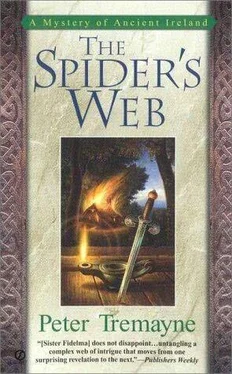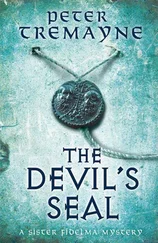Peter Tremayne - The Spider's Web
Здесь есть возможность читать онлайн «Peter Tremayne - The Spider's Web» весь текст электронной книги совершенно бесплатно (целиком полную версию без сокращений). В некоторых случаях можно слушать аудио, скачать через торрент в формате fb2 и присутствует краткое содержание. Жанр: Исторический детектив, на английском языке. Описание произведения, (предисловие) а так же отзывы посетителей доступны на портале библиотеки ЛибКат.
- Название:The Spider's Web
- Автор:
- Жанр:
- Год:неизвестен
- ISBN:нет данных
- Рейтинг книги:5 / 5. Голосов: 1
-
Избранное:Добавить в избранное
- Отзывы:
-
Ваша оценка:
- 100
- 1
- 2
- 3
- 4
- 5
The Spider's Web: краткое содержание, описание и аннотация
Предлагаем к чтению аннотацию, описание, краткое содержание или предисловие (зависит от того, что написал сам автор книги «The Spider's Web»). Если вы не нашли необходимую информацию о книге — напишите в комментариях, мы постараемся отыскать её.
The Spider's Web — читать онлайн бесплатно полную книгу (весь текст) целиком
Ниже представлен текст книги, разбитый по страницам. Система сохранения места последней прочитанной страницы, позволяет с удобством читать онлайн бесплатно книгу «The Spider's Web», без необходимости каждый раз заново искать на чём Вы остановились. Поставьте закладку, и сможете в любой момент перейти на страницу, на которой закончили чтение.
Интервал:
Закладка:
She turned and regarded Dubán without a change of expression.
The warrior lowered his gaze before her fiery green eyes.
‘Teafa had also been a victim but she had saved some of her self respect as well as her sister’s son. Móen was the saddest victim of them all.’
‘And wasn’t I a victim?’ demanded Cranat harshly. ‘I was a princess of the Déisi and yet I was forced to reduce myself in wedlock to this depravity?’
‘Forced? You were prepared to put up with it. Even when Teafa first came to warn you years ago that your husband was continuing his degeneracy and had encouraged your own daughter into his bed when she was only twelve or thirteen!’
‘That’s not true!’ gasped Crón, starting forward, her face draining of blood.
‘No?’ Fidelma grimaced sourly. ‘You have already confessedas much. Better these dark secrets should now be made known. Teafa saw Eber’s vileness starting all over again with you, Crón. You became a victim too. She went to warn Cranat to leave, to divorce and take you with her. But Cranat was content to merely remove herself from her husband’s bed and continued to live here because here was wealth and security. She left her daughter to fend for herself. It was not Cranat who then refused to speak further with Teafa but Teafa with Cranat.’
There was a deathly silence in the hall of assembly.
Fidelma turned to Crón and regarded her sorrowfully.
‘Yes, Crón, you were a victim but you also made yourself mistress of the situation. You used your father’s lascivious desires to wheedle yourself into power. Muadnat had been your father’s tanist. A few weeks ago you felt yourself strong enough to be able to demand that your father nominate you as tanist and then use his power to ensure the derbfhine support you. Indeed, because of Eber’s bribes only four people stood against you. Your own mother and Teafa, who both knew the price that you were paying; Agdae, Muadnat’s nephew; and Menma who was bound to Muadnat not only as a relative but by the power of Muadnat’s gold. You are unfit to hold office.’
She swung round again on Dubán.
‘And without office, Dubán, how long will you declare your love for Crón? Tomnat recognised that relentless ambition in you twenty years ago, when she felt that she could not confide her terrible secret. Now that Crón’s secret, the same secret, is out, will you remain faithful? No!’ She raised her hand as he made to answer. ‘No protestations now. Do not answer me until after the meeting of the derbfhine has declared whether Crón is to be chieftain of Araglin or not.’
Fidelma turned to the hall, sweeping everyone with her passionate gaze.
‘Morann of Tara once said, evil can enter as a tiny seed and, if unchecked, grows into an oak tree. A forest has grown here. Thehope of Araglin lies in the innocence of youth, of boys like Archú and girls like Scoth.’ She smiled suddenly at Clídna. ‘And if any single haven of morality exists in this place, it is to be found here within this woman.’
Clídna blushed and hung her head.
Agdae rose slowly to his feet.
‘Your judgment on Araglin is harsh, sister,’ he said quietly. Then, with an awkward glance to the silent Cranat and her daughter, he added: ‘But it is not unjustly spoken. However, tell us how you came to identify Father Gormán? You also built up a good argument against Cranat.’
‘I knew it was unlikely that Cranat had killed them for a simple reason: if she had been the murderess then she would not have sent to my brother at Cashel to send a Brehon to make a formal investigation.’
‘Why did she do that?’ asked Eadulf.
‘Above all things, as we have learnt, Cranat is a princess of the Déisi. She did not want any finger of suspicion to be pointed at her house. She thought that the presence of a Brehon would lend moral weight to the matter. I believe that she really thought that Móen was guilty having discovered the truth of his birth.’
She gazed sorrowfully at Eadulf. ‘There was one point which destroyed the case against Cranat, which I presented purposefully to allay Gormán’s suspicion about where I was leading. Everyone failed to question it. That was good, otherwise Gormán might have been put on his guard but I am surprised some of you did not spot it.’
‘What was that?’ demanded Agdae gloomily.
‘You forgot the maxim — summa sedes non capit duos — the highest seat does not hold two. Crón had become tanist before her father’s murder. Muadnat was no longer tanist so Cranat could not have killed Eber with the hope of becoming wife of the new chieftain.’
‘Then what made you suspect Gormán?’ asked Gadra.
‘Easy to say,’ acknowledged Fidelma. ‘At Lios Mhór I first heard that Gormán was a fanatical advocate for Rome. As it turned out, he was simply a fanatic, an intolerant zealot, whatever he believed in. I learnt that he had built a chapel at Ard Mór and, I was informed, attracted much wealth to furnish it. His chapel here, Cill Uird, was equally opulent. Unlike most priests, he had money to equip and ride a horse.’
‘Wealth is not a sign of guilt,’ muttered Cranat.
‘It depends on where that wealth came from. Gormán had become the partner in a secret gold mine with Muadnat. How or why the partnership developed, perhaps we shall never know. My guess is that Muadnat, to exploit his mine and escape paying tribute to Eber, decided Gormán was a means of disguising where the gold came from. Gormán could pretend that it came as gifts from those who supported his beliefs. The gold was converted into riches stored in the chapels at Ard Mór and Cill Uird. What Muadnat overlooked was man’s inherent greed. Just because Gormán was a priest it did not mean that he was not a man.’
‘But why did he kill Eber and Teafa?’ demanded Crón, overcoming her resentment at what Fidelma had revealed about her relationship with her father.
‘I have said — he was an intolerant fanatic. Once he learnt that Eber was the father of Móen he was incensed against the immorality of it. Eber must be despatched to Gormán’s concept of hell and Móen, as a child of Eber’s incest, was to be punished by being accused of the murder. I have already explained that Teafa was killed to keep her silent about the evidence of the Ogam stick. The motive with Eber was no more complicated than Gormán’s zealous morality.’
‘But how did he learn that Móen was Eber’s son?’ asked Crón. ‘Even I did not know of it before you told us.’
Fidelma looked hard at Cranat.
‘I think that you can answer this question. Two weeks ago Dubán saw you and Teafa arguing. You left that argument and went directlyto see Gormán. When Teafa found out that Crón had used her relationship with her father to become tanist, she went to you to argue further why this thing must not be so. She told you that Móen was the child of Eber’s incest?’
‘As priest here, Father Gormán had a right to know,’ replied Cranat.
‘But Gormán was a fanatic and that knowledge led directly to their deaths. After Cranat had told him, Gormán went in fury to accuse Eber and Teafa. Crítán witnessed the confrontation and saw Eber strike the priest. That was when Gormán decided to kill him.’
‘But what if Móen had not picked out the perfume of the church incense?’ Eadulf reflected. ‘I would have thought that such incense would have been a common enough odour to Móen to have recognised and identified it with the chapel before this?’
Fidelma shook her head sadly at Eadulf.
‘Don’t you remember that Gormán told us that he refused to allow Móen into the chapel? That he avoided him? Móen was, therefore, not able to identify the perfume before today.’
Читать дальшеИнтервал:
Закладка:
Похожие книги на «The Spider's Web»
Представляем Вашему вниманию похожие книги на «The Spider's Web» списком для выбора. Мы отобрали схожую по названию и смыслу литературу в надежде предоставить читателям больше вариантов отыскать новые, интересные, ещё непрочитанные произведения.
Обсуждение, отзывы о книге «The Spider's Web» и просто собственные мнения читателей. Оставьте ваши комментарии, напишите, что Вы думаете о произведении, его смысле или главных героях. Укажите что конкретно понравилось, а что нет, и почему Вы так считаете.











